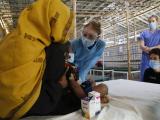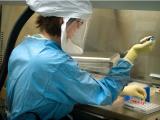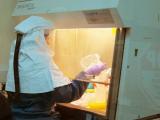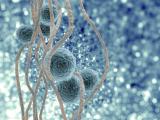Nov 5, 2001 (CIDRAP New) – Officials from the Mayo Clinic and Roche Molecular Biochemicals today announced the development of a DNA test that they say can accurately detect anthrax bacteria in human and environmental samples in less than an hour, far faster than currently available tests. They said they will begin making the test available free to public health laboratories this week to help combat the current spate of anthrax attacks.
"Mayo clinic scientists have developed a test that identifies anthrax in less than one hour," said Franklin Cockerill III, MD, a Mayo microbiologist, at a morning press conference in Rochester, Minn. "We will provide the test to local and regional laboratories so they can do rapid DNA tests." Besides speeding the lab work itself, this will eliminate the time it takes to send samples to distant labs such as the Centers for Disease Control and Prevention, he said. He added that the quick results will allay anxiety for people who may have been exposed to anthrax. Existing tests take 1 to 3 days to produce a firm result, officials said.
The new test uses polymerase chain reaction (PCR) technology to rapidly amplify anthrax DNA, Cockerill said. Because anthrax exposures are still rare, the test has not been clinically evaluated, but in laboratory tests it has achieved 100% sensitivity and specificity, Cockerill said. "We've done experiments looking at blood samples," he said. We spike them with decreasing amounts of anthrax . . . . We can detect as few as five organisms in a blood sample."
The new test was the subject of an abstract presented before the American Society for Microbiology in Orlando last May, and a detailed article describing the test has been written but is currently being withheld from publication because of security concerns, Mayo and Roche officials said. "Other labs will verify this because of the distribution of the tests," said Cockerill. "I'd love to publish the results, but because of security concerns we're limited in doing that." He also said security concerns prevent him from listing the names of all the scientists who helped develop the test.
"We will provide two dozen laboratories with the test this week," said Juergen Flach, PhD, vice president and general manager of Roche Molecular Biochemicals, based in Penzberg, Germany. The company decided to provide the test for free initially in order to speed its adoption, he said. The first labs to receive the test were not identified, but James Floberg, marketing manager for Roche Molecular Biochemicals, said they are CLIA (Clinical Laboratory Improvement Act) facilities that have LightCycler equipment made by Roche.
The first standard lot of the test will be ready in the second week of December, the Roche officials predicted. The retail price of the test has not been determined, but it will be in the same general range as PCR HIV tests, which cost about $50 each, they said.
Cockerill said Mayo researchers have been using PCR methods to detect infectious agents for about 10 years and started working with Roche about 3 years ago. After the terrorist attacks of Sep 11, he said, Mayo researchers focused their efforts entirely on possible bioterrorism agents and kicked their program into high gear. "My scientists have been working 25 hours a day on fast forward," he said. Flach commented, "What Dr Cockerill and his team have been able to accomplish in a short time is simply amazing."
Cockerill said the Mayo group was able to "put together the recipe and the ingredients for the test, but Mayo doesn't have the ability to produce these ingredients. So Roche picked up that part of the challenge."
The ASM abstract describing the new test says the test, using LightCycler technology, targets a specific sequence within one of two virulence plasmids that Bacillus anthracis contains. "PCR primers and probes were developed to identify a specific sequence in the virulence plasmid pXO2," the abstact states. "The assay (amplification and probe confirmation) can be completed in approximately 35 minutes." Cockerill said the test uses four DNA probes. "In the lab we've had no false-positive results," he added.
The Mayo and Roche officials said the CDC also has a DNA test for anthrax. Far from competing with the CDC, Mayo and Roche have been cooperating closely with the federal agency, the officials said. "We're working in concert with them and we've had great cooperation," said Cockerill.



















